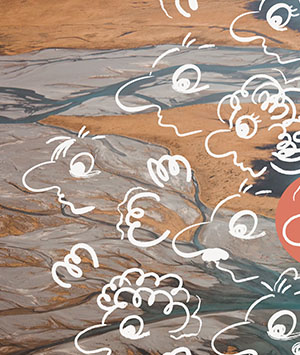Ness Labs: The Science of Curiosity 🧪
Edition #181 – March 9th, 2023
The Science of Curiosity
Did you notice how often kids tend to ask "why?" — why the sky is blue, why birds don't get electrocuted sitting on power lines, why there are so many languages in the world, why people die...
Then, somehow, as we grow up, we stop constantly questioning the world around us. We start to perceive our reality as self-evident, or we become so busy that we don't make space for these moments of playful mental exploration.
This is not just a subjective feeling. Scientists have extensively studied this phenomenon and even measured the rate at which our curiosity levels decline from childhood to adulthood. And this rate is remarkably fast.
I think we can all agree that this is a bit sad, and that we could all do with more episodes of curiosity in our lives. Well, the good news is: it is absolutely possible for adults to rekindle their curiosity!
This week, you'll learn all about the science of curiosity, how researchers investigate this complex area of psychology, and what you can do to inject more curiosity into your daily life. We'll also explore two fascinating tricks of the mind and how to avoid falling prey to them.
Enjoy your weekly dose of mindful productivity!
Anne-Laure.
P.S. Whether it is a new venture, a newborn, moving houses, moving cities... We all find ourselves at one point or another in a liminal space where the next steps are unclear and the future is uncertain. Join me and other community members for a virtual meetup next week all about navigating transitions.
🧠 Brain Food
The science of curiosity: why we keep asking “why” (6 min)
Written by Anne-Laure Le Cunff
Curiosity has magical properties which have been extensively studied by scientists, such as keeping you young, helping you learn, and fostering better relationships. However, large-scale studies suggest that our curiosity levels go from 98% in childhood to 2% in adulthood. What’s going on, and is it ever too late to rehabilitate our curiosity?
Magnification and minimization: two binocular tricks of the mind (6 min)
Written by Dr Hannah Rose
Although we'd like to think we have a realistic perception of ourselves and the world around us, many of our thoughts are actually inaccurate representations. Magnification and minimization are two such cognitive distortions that can trick the mind, impacting our sense of self, our mental health, and even the integrity of our decision-making. How can we learn to think more clearly?
💌 Brain Picks
• Nervous System Mastery is a five week bootcamp that will equip you with evidence-backed protocols to cultivate greater calm and agency over your internal state. You will learn how to rewire maladaptive stress responses, increase your capacity for focus and improve your sleep. Use code NESSLABS for a 10% discount.
• Circle is the all-in-one community platform for creators and brands. Bring together engaging courses, discussions, members, live streams, chat, events, and memberships — all in one place, all under your own brand. Try it for free for 14 days.
🍬 Brain Candy
Little nuggets from my Twitter bookmarks this week. Click on the card to see the full tweet including any links or media.
🤝 Brain Trust

|
Invest in your productivity and your mental health. Join the Ness Labs learning community for unlimited access to our online courses and workshops.
|
🌊 Brain Waves
If you enjoyed this edition, please share the love with fellow curious minds on Twitter or Whatsapp.
Until next week, take care!
Ness Labs by Anne-Laure Le Cunff
A weekly newsletter with science-based insights on creativity, mindful productivity, better thinking and lifelong learning.
February 27th, 2025A newsletter by Anne-Laure Le Cunff READ ON THE WEB Hello friends, Earlier this week, I was on a meeting with my publisher when I received the finished copies of Tiny Experiments. I thought it’d be fun to open the package while on the call… and I ended up crying in front of the entire team. There’s truly something special about holding in your hands the fruit of several years of work. The doubts, the questions, the research, the writing and rewriting… All of a sudden, this...
February 21st, 2025A newsletter by Anne-Laure Le Cunff READ ON THE WEB Hello friends, Two weeks left until the book launch! Tickets are sold out for NYC and London, with a few still available for Austin. I’m on my way to Boston where I’ve been invited to record a podcast. This morning, as I was journaling before heading to the airport, an amazing realization hit me: whatever the outcome of the launch, I’m incredibly lucky to share these ideas with the world. I had to learn how to read and...
February 13th, 2025A newsletter by Anne-Laure Le Cunff READ ON THE WEB Hello friends, This morning, I woke up to a familiar feeling I hadn’t felt so acutely in a while. “Oh, hello old friend,” I thought as I recognized the familiar pangs in my stomach – the ones that show up when I experience fear. Sometimes, it’s hard to pinpoint exactly where fear is coming from, but in this case, I know exactly what’s going on: just three weeks to go until the launch of Tiny Experiments, my biggest...